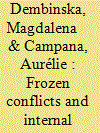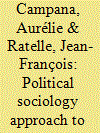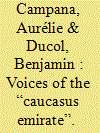| Srl | Item |
| 1 |
ID:
155320


|
|
|
|
|
| Summary/Abstract |
The complex architecture of fragmented authority in the international system remains under-theorized. Understanding the world of separatist regions that turn into de facto states is high on the research agenda. While patron states are said to be a necessary condition, we argue that it might not be a sufficient one to explain the varying degrees of survival/endurance of de facto states. This analytical essay is an effort to establish directions for research that would better account for the variation among cases by integrating their internal dynamics with what we already know about the role of external factors. Adopting a political sociology perspective, this article focuses on understudied aspects of internal processes and points to the role of local elites in state and nation-building during civil wars and after violence declines. We contend that such a perspective helps to account in a more comprehensive way for the processes underlying the status quo while, at the same time, analyzing the interplay between external and internal dynamics of frozen conflicts. We show that students of de facto states would gain from employing literatures on state-building and nation-building to articulate an analytical framework that would reassess the role of local elites in building a state and a nation, and analyze the societal (un)responsiveness as well as the strategies of passive or active accommodation, resistance or opposition within de facto states' populations.
|
|
|
|
|
|
|
|
|
|
|
|
|
|
|
|
| 2 |
ID:
132213


|
|
|
|
|
| Publication |
2014.
|
| Summary/Abstract |
This article seeks to foster a better understanding of the diffusion of conflict in the North Caucasus. We argue that diffusion of conflict is a dynamic and adaptive process in which outcomes are shaped by the intersection of three social mechanisms-attribution of similarity, brokerage, and outbidding-and the political, social, and religious contexts. We suggest that a distinction should be made between horizontal and vertical processes of diffusion. We also approach the empirical diffusion of conflict from a different perspective, showing that non-Chechen actors have played a key role in both the diffusion process and its outcomes.
|
|
|
|
|
|
|
|
|
|
|
|
|
|
|
|
| 3 |
ID:
140867


|
|
|
|
|
| Summary/Abstract |
This article looks at Internet use by insurgent groups in the North Caucasus in the context of a regional diffusion of violence. Using a mixed methods research design that combines hyperlink network analysis and micro-discourse analysis, it examines the online characteristics of the Caucasus Emirate and the main frames conveyed by the websites affiliated with the Emirate. It demonstrates the existence of a network of cross-referencing websites that, collectively, articulate the Emirate's political agenda online and allow for the dissemination of frames across the Web. It also shows that while jihadism provides a cultural resource that fosters a global sense of community, the jihadization of discourse does not eradicate local references as the local dynamics of the conflict have a strong impact on online communicative strategies. Finally, although based on a specific case study, this article highlights the potential of a mixed methods research design as applied to an analysis of virtual insurgent networks.
|
|
|
|
|
|
|
|
|
|
|
|
|
|
|
|